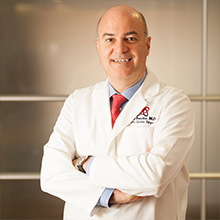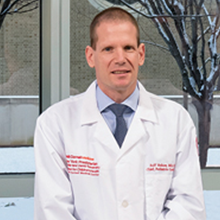As a top 5 high-volume center in the nation, physicians at NewYork-Presbyterian’s Congenital Heart Center—an integrated program of Columbia University Irving Medical Center and Weill Cornell Medicine—see not just a lot of cases, but a lot of complex cases. A nuance that allows cardiac surgeons and interventional cardiologists the opportunity to continually practice and refine their technique, even in the most difficult of cases..

Dr. Emile Bacha

Dr. Ralf Holzer
“We see some of the most complex and challenging cases, which propels us to think outside of the box to conduct collaborative and translational research that will address valve-related and heart failure-related unmet clinical needs,” says David Kalfa, MD, PhD, Director of the Pediatric Heart Valve Center at NewYork-Presbyterian/
From 2016 to 2019, Congenital Heart Center physicians performed 2,907 pediatric and adult congenital heart surgeries, 104 pediatric heart transplants, and 5,426 pediatric and adult catheter procedures—all with survival rates that far exceed the national average. The sheer volume of cases performed by our expert physicians often translates into leadership roles in many of the national leading quality registries, aimed at helping to improve patient outcomes through funded research and team-based clinical care.
“We see some of the most complex and challenging cases, which propels us to think outside of the box to conduct collaborative and translational research that will address valve-related and heart failure-related unmet clinical needs.” — Dr. David Kalfa
Leaders in Valve Disease
As leaders in the care of babies born with a single ventricle, our cardiac surgeons led by Emile Bacha, MD, Chief of Congenital and Pediatric Cardiac Surgery at NewYork-Presbyterian/
NewYork-Presbyterian’s Congenital Heart Center also uses an algorithm to differentiate whether to use the Ross or Ozaki aortic valve repair. An innovative procedure that removes the diseased aortic valve and creates a new aortic valve with leaflet templates from the patient’s own pericardium, NewYork-Presbyterian is one of the few centers in the nation to offer the Ozaki technique.
“We offer the entire range of surgical treatment options for complex congenital aortic valve disease, and we believe the Ozaki has a role for certain children,” says Dr. Bacha.
Congenital Heart Center physicians are able to collaborate with mechanical, electrical, chemical and biomedical engineers to conduct translational research projects through Dr. Kalfa’s Initiative for Pediatric Cardiology Innovation. Current studies include using polymers and tissue engineering to create replacement valves that can grow and conform to children’s anatomy over time, thereby reducing the need for multiple surgeries. Additionally, researchers are using artificial intelligence to develop soft robotics-based cardiac compression device technology to bring personalized treatment to children with heart failure.
Highest Volume Pediatric Heart Transplant Center in the Nation
Since its inception, the pediatric transplant program at NewYork-Presbyterian has pushed the envelope for transplantation in complex congenital heart patients, providing transplants to many children who are turned down by other institutions and programs. Currently led by Marc Richmond, MD, MS, and Warren Zuckerman, MD, NewYork-Presbyterian is ranked as the highest volume pediatric heart transplant center in the nation with outcomes exceeding national and local benchmarks, as reported by the Scientific Registry for Transplant Recipients (SRTR).
“Our mandate, from the very beginning, was to never say no to any child, even those with the most complex heart conditions. When we received children with very unusual anatomies, who were turned down by other programs, we figured out a way to transplant them. That mandate and passion continues today,” says Linda J. Addonizio, MD, Director Emeritus of the Program for Pediatric Cardiomyopathy, Heart Failure, and Transplantation at NewYork-Presbyterian/
“Many of our children are surviving 30 or more years with their heart transplant, and it’s quite a thrill to watch them flourish and attain their dreams.” — Dr. Linda J. Addonizio
Specializing in transplantation of children with heart failure and pulmonary hypertension as well as providing lifesaving support options for children with severe heart failure waiting for transplant, the heart failure/transplant team works hand in hand with the Pediatric Pulmonary Hypertension Center, directed by Erika Berman Rosenzweig, MD, which is the only pediatric pulmonary hypertension center that is accredited by the Pulmonary Hypertension Association in the tri-state region and one of only 8 in the country. NewYork-Presbyterian was the first to develop and implant the reversed valved Potts shunt—a novel surgery where we created a modified unidirectional valved shunt between the pulmonary artery and descending aorta to alleviate strain on the right side of the heart—as a palliative bridge for pediatric patients with end-stage pulmonary hypertension.
Mechanical assist devices are needed in up to 50% of our patients waiting for a heart transplant, speaking to the complexity and acuity of the referral base. As one of 8 vanguard sites across the country participating in the NIH-funded PumpKIN trial, we are examining the safety and efficacy of the Jarvik 2015, a miniaturized fully implantable continuous flow ventricular assist device aimed to support the smallest of our patients while minimizing complications encountered with other systems of mechanical support. In January 2020, physicians at NewYork-Presbyterian/Columbia implanted the fourth Jarvik 2015 as part of the PumpKIN trial, successfully bridging a toddler with dilated cardiomyopathy to heart transplant.
“The PumpKIN trial is an extraordinarily meaningful undertaking that defines our cardiac program. We hope this device proves to be safe to support many younger children with cardiac disease awaiting transplant,” says Sabrina Law, MD, Medical Director of the Pediatric Ventricular Assist Device Program in the Program for Pediatric Cardiomyopathy, Heart Failure and Transplantation at NewYork-Presbyterian/
First CICU for Newborns With CHD
As the first cardiac intensive care unit in the nation exclusively dedicated to the care of newborn infants with congenital heart disease, we are especially adept at caring for babies with some of the most complex and challenging cases. From the beds to the medical and surgical equipment, everything in the unit is designed for the tiniest newborns. The smallest patient to undergo cardiac surgery weighed just 500 grams (1.1 pound). For babies with complex heart conditions, our high-risk OB team collaborates with cardiovascular surgeons, interventional cardiologists, and cardiologists as well as multiple subspecialties to provide advanced care.
Pediatric Interventional Cardiology
Many of the pediatric interventional procedures at NewYork-Presbyterian’s Congenital Heart Center have moved from our operating rooms to our pediatric catheterization laboratories, offering our littlest patients nonsurgical options to decrease the number of open-heart surgeries throughout their lifetime. As one of the first in the country to successfully implant the Alterra adaptive prestent in patients with congenital heart disease, NewYork-Presbyterian/
“If proven safe and effective, transcatheter pulmonary valve therapy with the Alterra device can be lifechanging for patients with dysfunctional right ventricular outflow tracts that are too large in diameter for current transcatheter valves. By being able to implant a transcatheter valve for these patients, we reduce the total number of surgeries they may need over their lifetime,” says Alejandro Torres, MD, Director of Pediatric Cardiac Catheterization Laboratories at NewYork-Presbyterian/
“By being able to implant a transcatheter valve in patients with large right ventricular outflow tracts, we reduce the total number of surgeries they may need over their lifetime.” — Dr. Alejandro Torres
Preterm infants with congenital heart disease often require medical treatment or a cardiac catheterization procedure to close the ductus arteriosus. With expertise in percutaneous patent ductus arteriosus (PDA) closure in infants, interventional cardiologists led by Ralf Holzer, MD, Chief of Pediatric Cardiology and Director of Pediatric Cardiac Catheterization at NewYork-Presbyterian/
Novel Imaging
NewYork-Presbyterian’s Congenital Heart Center is increasingly using 3D imaging technology—including 3D printing—to create unique patient-specific models for guidance prior to catheter-based or surgical interventions for patients with heart failure. In 2020, we expanded the use of this technology to create 3D models for prenatal counseling, aiming to improve parental understanding of congenital heart defects. Research by advanced imaging expert Kanwal M. Farooqi, MD, includes a multicenter study assessing the utility of 3D printed models for preoperative planning of VAD placement in patients with congenital heart disease and heart failure.
Our renowned pediatric cardiology and cardiac surgery experts are committed to an integrated approach to the treatment of complex heart conditions providing the safest, most advanced pediatric heart care—from the prenatal and newborn period, through adolescence to adulthood.



